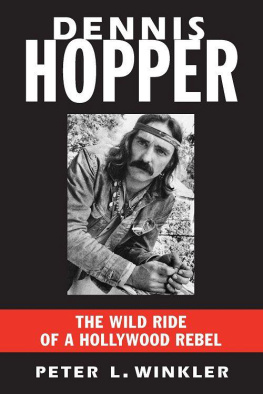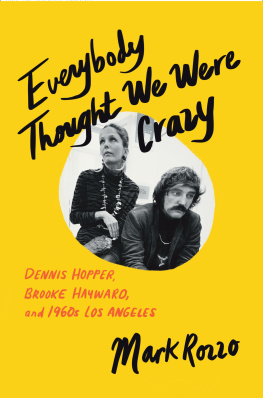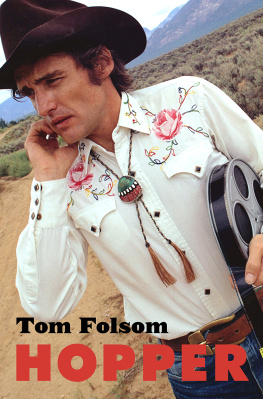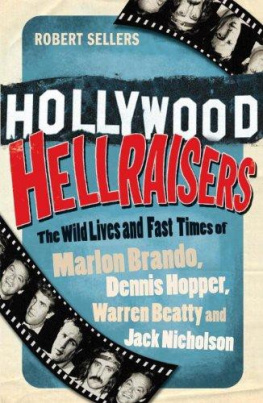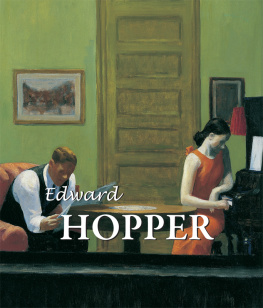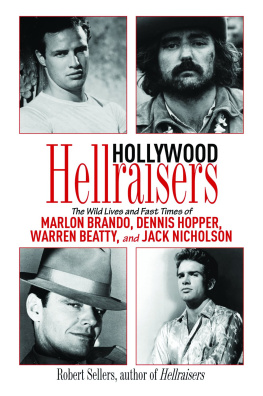

Published by Barricade Books Inc.
185 Bridge Plaza North
Suite 309
Fort Lee, N.J. 07024
www.barricadebooks.com
Copyright 2011 by Peter L. Winkler
All Rights Reserved
No part of this book may be reproduced, stored in a retrieval system, or transmitted in any form, by any means, including mechanical, electronic, photocopying, recording, or otherwise, without the prior written permission of the publisher, except by a reviewer who wishes to quote brief passages in connection with a review written for inclusion in a magazine, newspaper, or broadcast.
Library of Congress Cataloging-in-Publication Data
Dennis Hopper : the wild ride of a Hollywood rebel / Peter L. Winkler.
p. cm.
Includes bibliographical references and index.
ISBN: 978-1-56980-449-0
1. Hopper, Dennis, 1936-2010. 2. Motion picture actors and actressesUnited StatesBiography. 3. Motion picture producers and directorsUnited StatesBiography. I. Title.
PN2287.H66W57 2011
791.43028092--dc23
[B]
2011021805
ISBN: 978-1-56980-449-0
10 9 8 7 6 5 4 3 2 1
Manufactured in the United States of America
For my sister, Erica V. Marlowe,
who made it possible for me to write this book.
I remember that I was driving along one time away from Dodge City to Garden City, where the big farm was and whipping down this dirt road and goin about 70, and theres a strong wind coming from the right and I was really leaning into it, really leaning hard with my wheel, but I didnt realize it because Id been going that way for so long, and suddenly there were some granaries off to the right and it stopped the wind and I went into the ditch. I think that Ive been fighting the wind or fighting whatever it is for so long that I really have a great fear that if I stop turning the wheel hard into the wind, if something makes an obstacle, Ill go into the ditch.
When I was a child, I thought as a child. When I became a man, I still thought as a child [laughs].
Dennis Hopper, in the documentary
The American Dreamer (1971)

FIRST LIGHT
A lonely farm boy wonders where the trains are headed and follows them to Hollywood. I come from Kansas, which is nowhere. And I hate my parents, who are no one.
Dennis Hopper, introducing himself to writer
Gwen Davis at a Hollywood party in 1956
D ENNIS L EE H OPPER was born in Dodge City, Kansas, on May 17, 1936, to Jay Millard Hopper and Marjorie Mae Hopper (nee Davis). My grandparents were from KentuckyIm related to Daniel Boone, Dennis Hopper said. He was my great-great-great-uncle. Sarah Boone, his sister, was my great-great-great-grandmother.
Jay Hopper managed a grocery store in Dodge City until the outbreak of World War II and served as a lay minister in the Methodist church. After the war, he got a job with the postal services railway division, guarding the mail on the trains running from Kansas City to Denver. This entitled him to wear a sidearm, which impressed Dennis when he saw his father off at the railroad station and may have influenced the gun fetish that manifested itself in his adult life.
Well, my father was pretty busy, Dennis recalled. I mean, I learned more about him at his funeral than I did, really, growing up. Jay Hopper was a shadow in his sons life, a hard, totally secret man with no words, as Dennis later put it. Child-rearing was left to Marjorie Hopper, a temperamental fundamentalist with 19th-century values who was unprepared for motherhood. The backstroke champion of Kansas, Marjorie was on her way to the Olympics until she became pregnant with Dennis when she was only seventeen.
It was my mother, Dennis said, basically, who took care of those things, even though we had a terrible relationship, my mother and I. I mean, she screamed, yelled, and threw things at me. It was a terrible, terrible relationship. I wanted to be an actor. I decided when I was very young, when I first saw movies, that I wanted to be an actor. Dennis desire to become an actor was anathema to his mother and became the source of constant friction between them.
Brooke Hayward, Hoppers first wife, met his family in the 60s. Dennis grandfather was a sweetheart, she said. I think Dennis was fond of his father, but his mother was a nightmare. She talked endlessly, and you couldnt stop her. Hopper was the son of an unemotional father and an overly emotional mother, CBS News reported in 2004. She was wild, very emotional, a screamer and a yeller, Hopper said about his mother. My mother had an incredible body, and I had a sexual fascination for her. I never had sex with my mother, but I had total sexual fantasies about her.
Until he was ten, Dennis spent most of his time on his grandparents little twelve-acre farm seven miles outside of Dodge City, where they grew Chinese elms and alfalfa, and kept chickens, cows, and pigs. It was the dust bowl, Hopper said, so I had to wear a gas mask to school five days a week because the dust was so heavy in the air, and my grandmother would open the door, and five inches of dust would blow inside. The sky was obliterated by dust storms a lot of the time. There were bread lines and soup lines, and it was really bad. The whole middle of the country had blown away.
My early memories of Kansas are like, sort of classical stuff, he said. There was a ditch in front of the house, a lot of weeds, a very fertile place, Kansas. There was a dirt road in front, a mailbox. A country road. I got my first sheepdog from the brother of the Clutters, the family that was murdered years later that Capote wrote about in In Cold Blood .
I never knew my father or my mother very well, Hopper said. I very seldom saw my fatherwhich I resented tremendously. Dennis father joined the military when he was six, and his mother trained lifeguards for the Red Cross and managed an outdoor swimming pool in Dodge City. Dennis grandmother was his only company during the day, when his grandfather worked on a large wheat farm sixty miles away in Garden City.
As a little tiny child he didnt have anyone to play with, Marjorie Hopper said. We didnt live where there were a lot of children, so he only knew children when he was at school. Grandmother read him every childs book in the Dodge City library before he was in kindergarten and was reading him novels.
Most of the time I spent alone, daydreaming, Hopper said. I didnt do much; occasionally I cleaned out the chicken house. I watched more than anything else. Wheat fields all around, as far as you could see. No neighbors, no other kids.
With little else to do, Dennis would look at the horizon line or lie in the ditch with his dog, watching the daily procession of flatcars loaded with heavy farm equipment rumble by until they disappeared over the horizon. I used to spend hours wondering where it came from and where it went to, he said.
My grandfather and my grandmother Davis were my best friends. I shot a BB gun at the black crows, Hopper recalled in an autobiographical sketch. I fought the cows with a wooden sword. I hung ropes in the trees and played Tarzan. I listened to Joe Louis fight on the radio. I fed the chickens, pigs, cows. I swam in the swimming pool my mother managed in Dodge. I got a telescope and looked at the sun and went blind for five days. I caught lightning bugs, lightning shows, sunsets and followed animal tracks in the snow. I had a kite. I used the telescope to burn holes in newspapers. The sun was brighter than I was. God was everywhere and I was desperate. I walked on the rails on the train tracks. I shot marbles with an agate shooter. I caught catfish and carp in the river. I wondered what mountains looked like and skyscrapers. I imagined them on the Kansas horizon.
Next page
